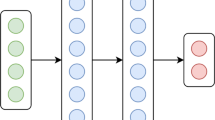Abstract
Entity recognition is an essential part of a task-oriented dialogue system and is considered as a sequence labeling task. However, constructing a training set in a new domain is extremely expensive and time-consuming. In this work, we propose a simple framework to exploit neural word embeddings in a semi-supervised manner to annotate medical named entities in Korean. The target domain is the automatic medical diagnosis, where disease name, symptom, and body part are defined as the entity types. Different aspects of the word embeddings such as embedding dimension, window size, models are examined to investigate their effects on the final performance. An online medical QA data has been used for the experiments. With a limit number of pre-annotated words, our framework could successfully expand the training set.
Access this chapter
Tax calculation will be finalised at checkout
Purchases are for personal use only
Similar content being viewed by others
Notes
- 1.
- 2.
The trained model and the annotated dataset will be soon available.
References
Bontcheva, K., Derczynski, L., Roberts, I.: Crowdsourcing named entity recognition and entity linking corpora. In: Ide, N., Pustejovsky, J. (eds.) Handbook of Linguistic Annotation, pp. 875–892. Springer, Dordrecht (2017). https://doi.org/10.1007/978-94-024-0881-2_32
Chen, H., Liu, X., Yin, D., Tang, J.: A survey on dialogue systems: recent advances and new frontiers. SIGKDD Explor. Newsl. 19(2), 25–35 (2017)
Dai, A.M., Le, Q.V.: Semi-supervised sequence learning. Adv. Neural Inf. Process. Syst. 28, 3079–3087 (2015)
Li, X., Chen, Y.N., Li, L., Gao, J., Celikyilmaz, A.: End-to-end task-completion neural dialogue systems. In: Proceedings of the Eighth International Joint Conference on Natural Language Processing (vol. 1: Long Papers), pp. 733–743 (2017)
Luan, Y., Ostendorf, M., Hajishirzi, H.: Scientific information extraction with semi-supervised neural tagging. In: Proceedings of the 2017 Conference on Empirical Methods in Natural Language Processing, pp. 2641–2651 (2017)
Mo, K., Zhang, Y., Li, S., Li, J., Yang, Q.: Personalizing a dialogue system with transfer reinforcement learning. In: AAAI (2018)
Mrkšić, N., et al.: Counter-fitting word vectors to linguistic constraints. In: Proceedings of the 2016 Conference of the North American Chapter of the Association for Computational Linguistics: Human Language Technologies, pp. 142–148 (2016)
Mrkšić, N., OSeaghdha, D., Wen, T.H., Thomson, B., Young, S.: Neural belief tracker: data-driven dialogue state tracking. In: Proceedings of the 55th Annual Meeting of the Association for Computational Linguistics (vol. 1: Long Papers), pp. 1777–1788 (2017)
Nguyen, A.T., Wallace, B., Li, J.J., Nenkova, A., Lease, M.: Aggregating and predicting sequence labels from crowd annotations. In: Proceedings of the 55th Annual Meeting of the Association for Computational Linguistics (vol. 1: Long Papers), pp. 299–309 (2017)
Peters, M., et al.: Deep contextualized word representations. In: Proceedings of the 2018 Conference of the North American Chapter of the Association for Computational Linguistics: Human Language Technologies, vol. 1 (Long Papers), pp. 2227–2237 (2018)
Radford, A., Sutskever, I.: Improving language understanding by generative pre-training. In: arxiv (2018)
Ratner, A.J., De Sa, C.M., Wu, S., Selsam, D., Ré, C.: Data programming: creating large training sets, quickly. Adv. Neural Inf. Process. Syst. 29, 3567–3575 (2016)
Kondreddi, S. K., Triantafillou, P., Weikum, G.: Combining information extraction and human computing for crowd sourced knowledge acquisition. In: IEEE 30th International Conference on Data Engineering (2014)
Wei, Z., et al.: Task-oriented dialogue system for automatic diagnosis. In: Proceedings of the 56th Annual Meeting of the Association for Computational Linguistics (vol. 2, Short Papers), pp. 201–207 (2018)
Wen, T.H., et al.: A network-based end-to-end trainable task-oriented dialogue system. In: Proceedings of the 15th Conference of the European Chapter of the Association for Computational Linguistics, vol. 1, Long Papers, pp. 438–449 (2017)
Yang, Z., Cohen, W.W., Salakhutdinov, R.: Revisiting semi-supervised learning with graph embeddings. In: Proceedings of the 33rd International Conference on International Conference on Machine Learning, ICML 2016, vol. 48, pp. 40–48 (2016)
Yang, Z., Hu, J., Salakhutdinov, R., Cohen, W.: Semi-supervised QA with generative domain-adaptive nets. In: Proceedings of the 55th Annual Meeting of the Association for Computational Linguistics, pp. 1040–1050, July 2017
Acknowledgments
This work is partially supported by two projects, Smart Multimodal Environment of AI Chatbot Robots for Digital Healthcare (P0000536) and the Project of Korean Management of Technology Specialists Training (N0001611) funded by the Ministry of Trade, Industry and Energy (MOTIE).
Author information
Authors and Affiliations
Corresponding author
Editor information
Editors and Affiliations
Rights and permissions
Copyright information
© 2019 Springer Nature Switzerland AG
About this paper
Cite this paper
Kim, YM. (2019). Training Set Expansion Using Word Embeddings for Korean Medical Information Extraction. In: Gadepally, V., et al. Heterogeneous Data Management, Polystores, and Analytics for Healthcare. DMAH Poly 2019 2019. Lecture Notes in Computer Science(), vol 11721. Springer, Cham. https://doi.org/10.1007/978-3-030-33752-0_19
Download citation
DOI: https://doi.org/10.1007/978-3-030-33752-0_19
Published:
Publisher Name: Springer, Cham
Print ISBN: 978-3-030-33751-3
Online ISBN: 978-3-030-33752-0
eBook Packages: Computer ScienceComputer Science (R0)




